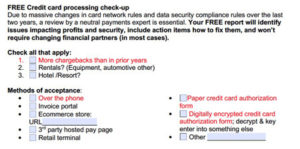How do businesses get started using 3-D Secure? Everything teams need to know to add 3-D Secure, a protocol providing an additional layer of security for eCommerce transactions prior to authorization. Think of it like a phone number or account number. 3-D Secure needs to be tied to your specific merchant account and then enabled on the payment gateway to be active.
- Unless the gateway provider is the same as acquirer, also known as credit card processor or merchant account provider, ask the gateway service provider for instructions for acquirer.
- Contact your merchant account sales relationship manager to request the service. If you don’t have one, call your merchant account customer support.
- The acquirer emails the response information to the requestor.
- The requestor then enables on the payment gateway or provides information to the end user for final enablement.
3-D Secure is a protocol providing an additional layer of security for eCommerce transactions prior to authorization. It enables the exchange of data between the merchant, card issuer and, when necessary, the consumer, to validate that the transaction is being initiated by the actual cardholder. Ecommerce transactions includes traditional shopping cart as well as any digital payment where the cardholder initiates and completes the payment process. For example, einvoicing or electronic bill presentment and payment are ecommerce transactions.
Each card network has a name for their product that uses 3-D secure, also referred to as 3D Secure, 3DS, 3-D Secure authentication or EMV 3-D Secure. Visa rebranded Verified by Visa to Visa Secure. MasterCard SecureCode (3DS 1.0) merchants are being encouraged to migrate to Mastercard Identity Check which uses EMV 3-D Secure 2.0. American Express SafeKey 2.0 is also available now. 3-D Secure 2.x helps reduce fraud and minimize the need for one-time passcodes, improving the user experience and reducing shopping cart abandonment.
What are merchant benefits for using 3-D Secure?
- More authorization approvals. False declines are a significant source of lost revenue.
- Some cards have reduced interchange rates when the authentication is invoked, which are usually over 90% of fees. American Express does reduce rates.
- Less friction for customers at checkout.
- Reduced risk of chargeback losses. Fraud liability for “it wasn’t me” automatically shifts to the issuer; Merchants do not have to defend those chargebacks, they never even see them.
How do merchants get started using 3-D Secure?
There are two elements- the payment gateway and the merchant account. Contact your payment gateway company to see if they support it and how to set it up. In most cases, this is simply a back office set up process. Merchants may also need to sign acceptance of pricing. The transaction fees are minimal and typically more than offset by the 11 to 20 basis point reduction in merchant fees on applicable cards.
Christine Speedy, Founder 3D Merchant Services, QIR certified, is a credit card processing expert with specialized expertise in card not present and B2B payment processing technology. Less than 1% of all merchant services sales representatives are QIR certified by the PCI Council. Christine is an authorized reseller for Elavon and CenPOS products and services, in addition to other solutions.

